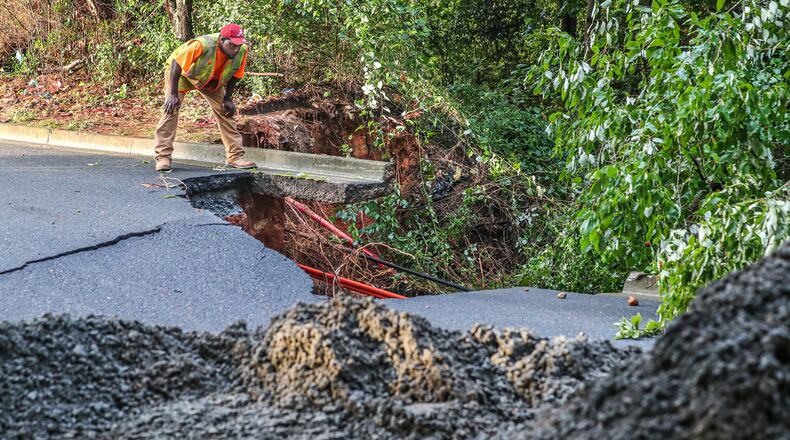When Jack Zhang and his wife Zhaojin Song bought their Marietta home in 2014, they had no idea there was supposed to be a trench in their backyard.
Doekes Gunning Homes, the Atlanta developer that built the couple’s four-bedroom ranch house along Jesters Court, was supposed to install a swale — a shallow ditch — between their property and their neighbor’s.
A 2003 plat approved by Cobb County officials ruled that a swale was necessary “to accommodate any overflows” if the shared drainage system for the two properties failed.
That’s exactly what happened during a Sept. 7 storm that drenched Atlanta’s north suburbs in several inches of rainfall. An underground drainage pipe built to route storm water from the couple’s property to the street was overwhelmed by the intense flash flood. Because the developer never installed the swale, there was no open channel to funnel the runoff from Zhang and Song’s property.
Their backyard was quickly submerged under four feet of water and the flood crashed into the family’s basement, causing more than $100,000 in damages.
“We are hoping that the county will take responsibility because they initially did not enforce the design,” Zhang said. “We have to push our case forward.”
Zhang and Song are among the hundreds of residents still reeling from damages the Sept. 7 flood caused to their homes. East Cobb County was one of the hardest hit areas, yet many homeowners contend they haven’t gotten enough help from state and local government officials to repair their properties.
Cobb County Commissioner Jerica Richardson will be hosting a “listening session” at 5:30 p.m. Thursday to hear from those residents. It will be the first in-person chance for impacted residents to discuss their burden at length.
“This is an opportunity for the entire community to come out and just share their particular experiences and stories, so that we can make sure we’re covering all of the different types of cases,” Richardson told the AJC on Wednesday.
Thursday’s community meeting will be held at the Cobb Civic Center, 548 South Marietta Parkway SE, Marietta.
Last month, the Board of Commissioners focused on securing funding to mitigate damage from recent floods as one of its priorities for the upcoming state legislative session.
Richardson represents Cobb’s district 2, which was the epicenter of the recent storm. She’s already met with dozens of homeowners one on one to hear their plights.
Richardson said she is still working with state and federal partners to find relief for Cobb’s devastated homeowners and to help push policy changes to what she described as an outdated stormwater management model.
“We’re calling it a listening session because in town halls, it tends to be the person presenting that takes up all the airspace,” Richardson said. “But this is really the opportunity for the community to do more talking, and for me to just listen.”
Many homeowners left to foot the bill for the damages to their homes have questioned why county officials denied them financial relief. Cobb County did not qualify for Federal Emergency Management Agency (FEMA) assistance.
Zhang says the county was negligent because inspectors failed to ensure that developers installed the swale. He did not become aware a swale was supposed to be there until after the storm, when he requested building permits, plats and other documents as part of an open records request.
The county’s stipulation that the developer build a swale on the property was a condition in fine print on the final plat. Song said it was so small she needed a magnifying glass to read it.
Local officials say they can only pay for damages on public property or for drainage pipes that have been conveyed to the county. Stormwater officials say the 20-foot wide drainage easement on Zhang and Song’s property was dedicated for public use.
But Cobb County Water department inspectors from Cobb County Water department came to the couple’s home Sept. 16 and surveyed their drainage pipe after they had cleaned it out. They said the inspector left a notice on their doorstep that said the “system is still in good working order, no blockage.” The county denied them assistance.
It’s estimated to cost $35,000 to build a swale on their property. Since the drainage easement is county-maintained, the homeowners’ plans must meet county approval.
The family wants to build concrete retention walls on both sides of the 5-foot trench to be dug out in the easement area. The county says the walls are not allowed.
“Now we’re in the dilemma,” Zhang said. “We are stuck now. We need the county to move to clear up the channel in case this happens again in the future. We cannot do it on our own.”
About the Author
Keep Reading
The Latest
Featured



